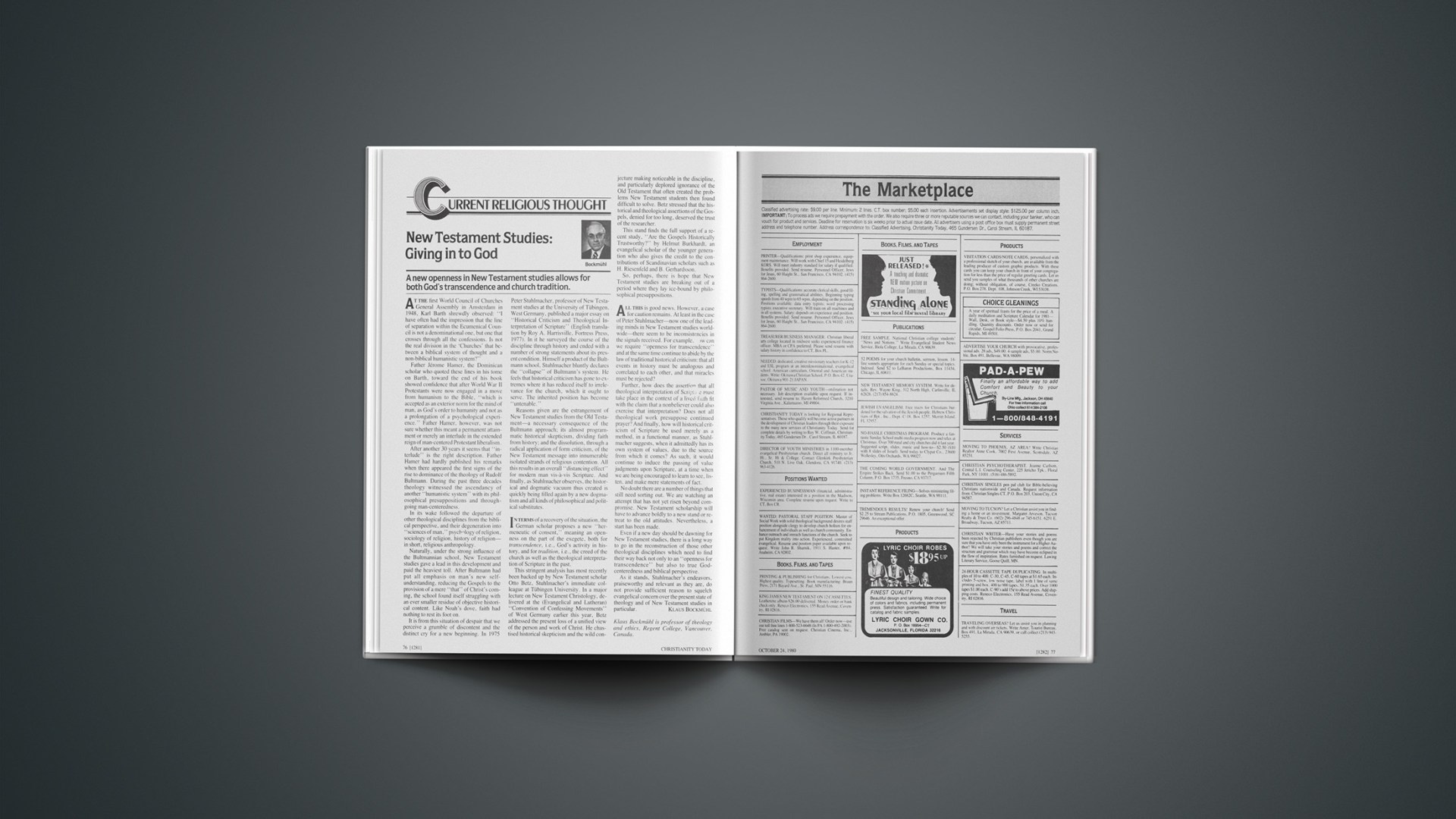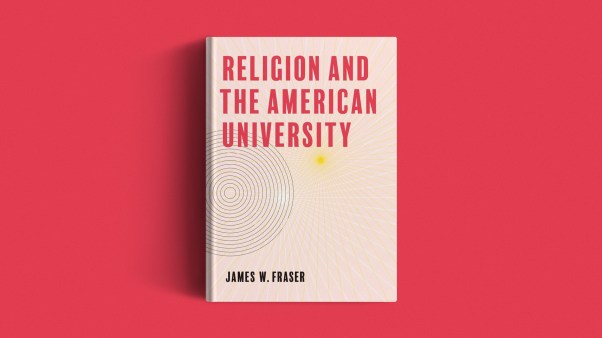A new openness in New Testament studies allows for both God’s transcendence and church tradition.
At the first World Council of Churches General Assembly in Amsterdam in 1948, Karl Barth shrewdly observed: “I have often had the impression that the line of separation within the Ecumenical Council is not a denominational one, but one that crosses through all the confessions. Is not the real division in the ‘Churches’ that between a biblical system of thought and a non-biblical humanistic system?”
Father Jérome Hamer, the Dominican scholar who quoted these lines in his tome on Barth, toward the end of his book showed confidence that after World War II Protestants were now engaged in a move from humanism to the Bible, “which is accepted as an exterior norm for the mind of man, as God’s order to humanity and not as a prolongation of a psychological experience.” Father Hamer, however, was not sure whether this meant a permanent attainment or merely an interlude in the extended reign of man-centered Protestant liberalism.
After another 30 years it seems that “interlude” is the right description. Father Hamer had hardly published his remarks when there appeared the first signs of the rise to dominance of the theology of Rudolf Bultmann. During the past three decades theology witnessed the ascendancy of another “humanistic system” with its philosophical presuppositions and through-going man-centeredness.
In its wake followed the departure of other theological disciplines from the biblical perspective, and their degeneration into “sciences of man,” psychology of religion, sociology of religion, history of religion—in short, religious anthropology.
Naturally, under the strong influence of the Bultmannian school, New Testament studies gave a lead in this development and paid the heaviest toll. After Bultmann had put all emphasis on man’s new self-understanding, reducing the Gospels to the provision of a mere “that” of Christ’s coming, the school found itself struggling with an ever smaller residue of objective historical content. Like Noah’s dove, faith had nothing to rest its foot on.
It is from this situation of despair that we perceive a grumble of discontent and the distinct cry for a new beginning. In 1975 Peter Stuhlmacher, professor of New Testament studies at the University of Tübingen, West Germany, published a major essay on “Historical Criticism and Theological Interpretation of Scripture” (English translation by Roy A. Harrisville, Fortress Press, 1977). In it he surveyed the course of the discipline through history and ended with a number of strong statements about its present condition. Himself a product of the Bultmann school, Stuhlmacher bluntly declares the “collapse” of Bultmann’s system. He feels that historical criticism has gone to extremes where it has reduced itself to irrelevance for the church, which it ought to serve. The inherited position has become “untenable.”
Reasons given are the estrangement of New Testament studies from the Old Testament—a necessary consequence of the Bultmann approach; its almost programmatic historical skepticism, dividing faith from history; and the dissolution, through a radical application of form criticism, of the New Testament message into innumerable isolated strands of religious contention. All this results in an overall “distancing effect” for modern man vis-à-vis Scripture. And finally, as Stuhlmacher observes, the historical and dogmatic vacuum thus created is quickly being filled again by a new dogmatism and all kinds of philosophical and political substitutes.
In terms of a recovery of the situation, the German scholar proposes a new “hermeneutic of consent,” meaning an openness on the part of the exegete, both for transcendence, i.e., God’s activity in history, and for tradition, i.e., the creed of the church as well as the theological interpretation of Scripture in the past.
This stringent analysis has most recently been backed up by New Testament scholar Otto Betz, Stuhlmacher’s immediate colleague at Tübingen University. In a major lecture on New Testament Christology, delivered at the (Evangelical and Lutheran) “Convention of Confessing Movements” of West Germany earlier this year, Betz addressed the present loss of a unified view of the person and work of Christ. He chastised historical skepticism and the wild conjecture making noticeable in the discipline, and particularly deplored ignorance of the Old Testament that often created the problems New Testament students then found difficult to solve. Betz stressed that the historical and theological assertions of the Gospels, denied for too long, deserved the trust of the researcher.
This stand finds the full support of a recent study, “Are the Gospels Historically Trustworthy?” by Helmut Burkhardt, an evangelical scholar of the younger generation who also gives the credit to the contributions of Scandinavian scholars such as H. Riesenfeld and B. Gerhardsson.
So, perhaps, there is hope that New Testament studies are breaking out of a period where they lay ice-bound by philosophical presuppositions.
All this is good news. However, a case for caution remains. At least in the case of Peter Stuhlmacher—now one of the leading minds in New Testament studies worldwide—there seem to be inconsistencies in the signals received. For example, how can we require “openness for transcendence” and at the same time continue to abide by the law of traditional historical criticism: that all events in history must be analogous and correlated to each other, and that miracles must be rejected?
Further, how does the assertion that all theological interpretation of Scripture must take place in the context of a lived faith fit with the claim that a nonbeliever could also exercise that interpretation? Does not all theological work presuppose continued prayer? And finally, how will historical criticism of Scripture be used merely as a method, in a functional manner, as Stuhlmacher suggests, when it admittedly has its own system of values, due to the source from which it comes? As such, it would continue to induce the passing of value judgments upon Scripture, at a time when we are being encouraged to learn to see, listen, and make mere statements of fact.
No doubt there are a number of things that still need sorting out. We are watching an attempt that has not yet risen beyond compromise. New Testament scholarship will have to advance boldly to a new stand or retreat to the old attitudes. Nevertheless, a start has been made.
Even if a new day should be dawning for New Testament studies, there is a long way to go in the reconstruction of those other theological disciplines which need to find their way back not only to an “openness for transcendence” but also to true God-centeredness and biblical perspective.
As it stands, Stuhlmacher’s endeavors, praiseworthy and relevant as they are. do not provide sufficient reason to squelch evangelical concern over the present state of theology and of New Testament studies in particular.
Klaus Bockmühl is professor of theology and ethics, Regent College, Vancouver, Canada.










